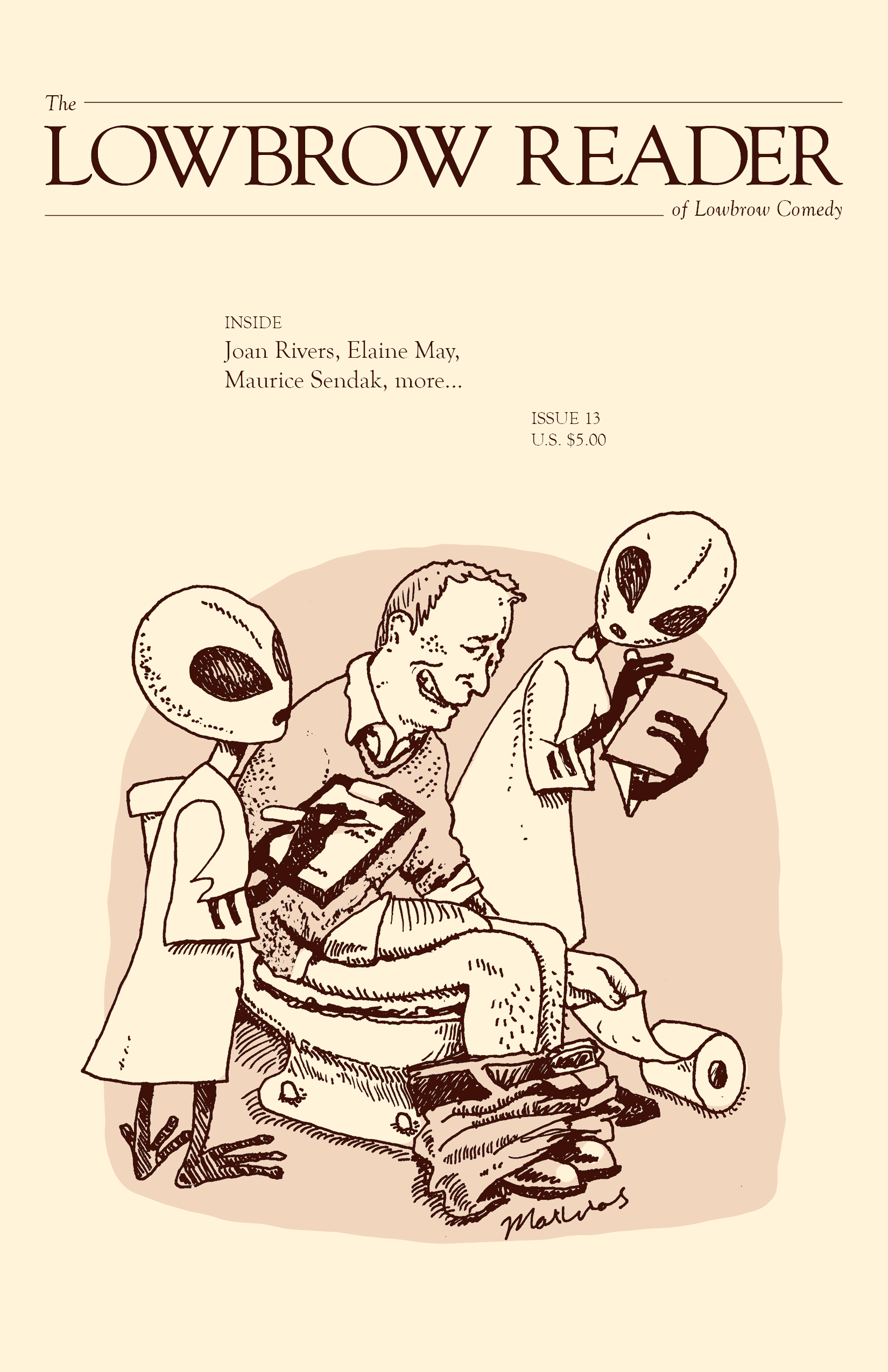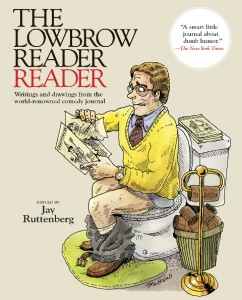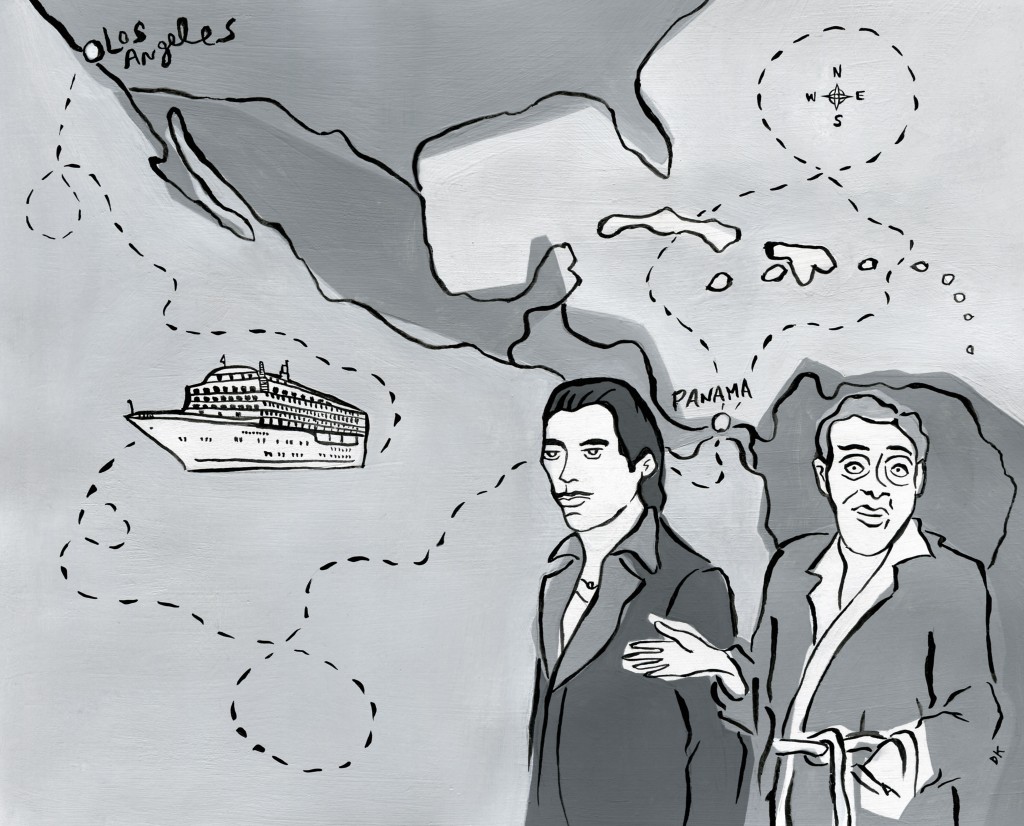My Name Is Julio: I’m So Bad, I Should Be in Detention
[Article and illustration from Lowbrow Reader #9, 2014]
In Central Park, a man on a bench turns to me accusingly. “I don’t know who you are,” he says, “but my wife thinks you’re somebody. It is making her go insane.”
I examine the wife, who is holding a bag of empty cat food cans; her head is carefully wrapped in tinfoil. “Your wife is a baked potato,” I say, “and she is insane. Now put some sour cream, chives, and bacon bits on her. We are done.”
I stand to leave and collide with a girl who is texting while skateboarding. I help her to her feet and she punches me. “I know who you are,” she says. “You delivered the pizza to Spicoli in Fast Times at Ridgemont High.”
I can build a time machine entirely from teak, cure morbid obesity in preteens, and conclusively solve the Kennedy assassination, and still people will identify me as such. I am a character actor, professionally descending from a proud lineage of Hollywood figures who proved that the doorman or cab driver can be just as important to a film as its star. And so, to stoners and former juvenile delinquents I am Jeff Spicoli’s pizza boy. Girls and feminine boys—these bitchy bugs in oversized sunglasses—know me as the Olsen Twins’ nanny. To the kindly women working security at LaGuardia, I am Monica’s boss on Friends.
But the people who warm my heart are those who recognize me from Easy Money, the 1983 Rodney Dangerfield film. These are typically denizens of the tri-state area—the tri-state era, really. They are honest, working-class men and women, first responders who came of age in the waning days of a macho superheat defined by Norman Mailer and Angie Dickinson and seasoned by Dangerfield. In Easy Money, viewers witness a virtuoso performance by Rodney, who, with only a handful of films, carved out a space in entertainment that will stand until the end of pop culture. They also see me, age 21, portraying Julio—Rodney’s Puerto Rican son-in-law, wed to Jennifer Jason Leigh, trying to fit in, wearing a sleazy period mustache and a polyester tuxedo.
* * * * *
My first comedy gig was on the boardwalk in Venice Beach, performing in a group called the L.A. Connection. Our audience was composed predominantly of hippies who had been kicked out of Big Sur for urinating on the redwoods. It was more akin to the circus than to comedy—we had to bark up the crowd, like in an old black-and-white movie. After one of our shows on the expansive green lawn, an elfin man approached and, speaking in a crisp brogue, told me how much he enjoyed the performance. He claimed to be from Dublin. I had never met anybody from Ireland, and savored his screwy Lucky Charms accent. He attended our shows week after week.
We became close enough that one day, the leprechaun was forced to come clean: He did not hail from Dublin and his accent was fake. He was an American actor named Robin Williams, preparing to star in a sitcom called Mork & Mindy. He asked me to hang out with him at Paramount Studios. Sitting on the bleachers, I watched my fake Irish friend portray a space alien. “This show,” I thought, “will never fly.”
I was wrong, of course. Robin struck a chord; before I knew it, he was on the cover of Time. For a brief moment, I became a select member of his posse and we ended up in an improv group together, the Comedy Store Players. We had lines around the block. After shows, there would be great commotion in the dressing room as it filled with Lou Reed lookalikes named Hercules and Raquel, all shaking tiny bottles of cocaine.
Robin loved cocaine and we loved Robin, so we went with Robin to parties with sniff in the air. I did not enjoy cocaine. It made me want to vacuum every hallway in every apartment building in the world. I quickly learned the art of pretending to do cocaine—this being Los Angeles, fake drug abuse was generally as acceptable as actual drug abuse—by putting one end of the mini-straw into my nose and the other end to the side of the acrid substance. It was like moving Brussels sprouts around one’s plate as a child.
One night, we went to Harry Nilsson’s house in Bel Air. A mid-century poem of a home, surrounded by oaks, ferns and delphiniums, it looked like a house painted by Thomas Kinkade, if Thomas Kinkade was in the fourth stage of heroin abuse. The only light in the house came off of a bong. The famous did lines off beveled glass-mirrored tables. Nilsson busted me. “I see what you’re doing,” the musician said. “You’re faking doing cocaine.” I felt so humiliated, worried that I would get that early ’80s lecture: Don’t you know there are people in the Valley going to bed tonight without any cocaine at all?
At the Comedy Store, I developed a character named Hijo de la Gran Puta. He was a gigolo in the Beverly Hills Hotel—a sensual Latino with staggering bravado. He always drew a big response from the crowd. After one of our shows, Robin’s publicist, Estelle Endler, came backstage and told me that her husband Michael Endler had written a movie for Rodney Dangerfield, with Dennis Blair. They wanted me to appear in the film, using an adaptation of my gigolo character. I was cast as Julio, Rodney’s son-in-law; Jennifer Jason Leigh, who I knew from Fast Times, was playing my wife. With neither screen test nor audition, I was sent to New York City and given a suite at the Mayflower Hotel, a shabby place on Central Park West with an 80-year-old doorman named Timmy and an 85-year-old doorman named Jimmy. Robert De Niro, the gold-standard of cool, lived in the penthouse. I was quickly sent to fittings for my character’s lavender polyester grooms tuxedo and assorted atrocities of the day.
Easy Money was Rodney’s first star vehicle—he was 61 at the time of its release—and his first film after Caddyshack. The script, credited to Blair and Endler along with Dangerfield and the humorist P.J. O’Rourke, serves up the Tiffany lamp of inane premises: A Staten Island man, Monty Capuletti, is offered ten million dollars if he can stop drinking, gluttonizing, and doing drugs. At the same time, Monty has to deal with his young daughter’s marriage to the macho Hispanic.
I was 21. I had never had a key part in a movie that required me to speak in an accent and make out with a girl. My standup demigods were Richard Pryor, Steve Martin, Lily Tomlin, and the Hawaiian shirt–clad David Letterman. But I was excited to work in a movie with Rodney as well as with Joe Pesci, just a couple of years removed from Raging Bull, and also with Jeffrey Jones, who would be so brilliant in Amadeus and Ferris Bueller’s Day Off. Billy Joel wrote and performed the film’s title song, cementing us all to this 1980s fever dream.
After a week in New York, I still had not met Rodney. So on a brisk fall day, I waited for his car in front of the hotel, where the Go-Go’s caroused like men in porkpie hats. I felt very much the outsider. A decade-old limousine pulled up, its interior reeking of grass and cold cuts. A pillow in the backseat clearly had witnessed significant slumber—a haiku of endless nights. The chauffer ferried me to a midtown hotel, where I was taken to a brightly lit room. There were boxes of dirty-water hot dogs; a boxing match screened on the console TV. Rodney greeted me, wearing a bathrobe, then sat back to examine me as if I were a beat-up Impala. His balls poked out from the bathrobe, striving for a freedom that would never be theirs.
I stood before Rodney and his gang, stuffed into Jordache jeans and a zebra shirt. My hair was greased back to achieve the look of Julio. Rodney’s shy eyes bulged and stared at me too closely, barely concealing a hint of sneer. The moment I left the room, stink eye would set in—that much was obvious. I got the distinct feeling that the comedian took me for a bona fide Puerto Rican from the Bronx—not a child of Southern California whose parents resembled the people you saw in cigarette ads on the back of Life magazine. Still, it was decided that I did not look Puerto Rican enough. My blue eyes—an odd byproduct of Puerto Rican, Jewish, and Italian heritage—were apparently the tell. “No Spanish person would have blue eyes,” Rodney said.
“But I am Spanish,” I pleaded.
I was sent to an optometrist and fit for black contacts. With glass in my eyes, I felt powerless and cried. I strove to relax. But Rodney could never relax.
* * * * *
I have set sail. I write from my desk aboard the Crystal Serenity, a five-star cruise where I am the guest of a showbiz friend hired to entertain the tourists. We are traveling from the Atlantic Ocean to the Pacific Ocean through the Panama Canal—“a voyage between two seas,” according to the promotional brochure. Our accommodations are sublime; don’t get me started on our personal butler. I snack off of medieval feasting tables as I watch turtles, dolphins, and whales swim the sapphire sea. I stroll the decks, yearning to draw an upper-class woman without her bra on. But mostly, I write about Rodney and these events of three decades past. Sometimes when you travel fast, you find the velocity of your life leaving you in free fall, forcing you to hunt down bits and pieces of a narrative. The past boils up.
Floating through Panama and the various ports of call, I hear the accent of my people—that funny, twisted way of talking, accents awash in Coca-Cola and the stations of the cross. I descend in part from Puerto Ricans, a people with warring bloodlines. Those who are too dark do not like those who are too light, which can upset the family dynamic when Mom is dark and Dad is light. My grandmother, Flora Vidal, traced her lineage to Vienna and Rome. She looked at her fellow Puerto Ricans with a racist scowl, and told me that the Puerto Ricans from New York did not like those from the island.
The Puerto Ricans in my family wore crisp ironed shirts, even in the extreme heat. They smelled of Jean Nate, rum, and rosary beads. They were overtly sexual and liked to dance; the women would jiggle like flan, and the flan like women. All seemed good in the world. Countless nights I fell asleep listening to the laughing and dancing in our leafy Los Angeles suburb, where the Jews changed their names to “Miller” and the Mexicans explained that they were not Mexican—only their parents were Mexican.
Years later, I met Gore Vidal. I shyly told him that my paternal grandmother’s name was also Vidal. The great author narrowed his eyes. “Are you Jewish or Italian?” he asked on exhale. “Well, Sir,” I finally answered, “both? And I loved Burr.”
* * * * *
I stopped lying about my age and now simply tell people that I was born sometime between the Bay of Pigs Invasion and the fateful night that Britney Spears shaved her head and was carted away in an ambulance. Yet I am old enough to remember when the smart money was on Jermaine Jackson. I am old enough to recall when starlets had to send photographs of their genitals using rotary phones (don’t ask). And I am nearing the age that Rodney Dangerfield was when he played my father-in-law in Easy Money.
Can you imagine a Hollywood comedy being green-lit today with a headliner Dangerfield’s age? It is unlikely, and yet so was his career. By the time of Easy Money, he was deep into his second act. Before even assuming the name Rodney Dangerfield, the former Jacob Cohen had left comedy for a spell, spending the 1950s selling (what else?) aluminum siding in (where else?) New Jersey. Sandwiched between Caddyshack and Back to School, Easy Money was the second entry in what would prove a wildly lucrative film career.
Like an elderly, Judaic Justin Bieber, Rodney was enjoying his success. Yet he was jittery, looking at the world through those goldfish eyes, which always hinted at sadness. When I encountered him, the comic was experiencing that rare American gift—a second chance—and was determined not to blow it and reclaim the punch line. Dangerfield’s father had worked in vaudeville, and Rodney learned early that killing onstage required him to know his jokes—the grammar and rhythm of getting and maintaining laughs. He had to work constantly; he had to stay nervous.
Rodney was organized and precise, as most comedians are, as much as they may conceal it. When he appeared on The Tonight Show, he had practiced his set for weeks—and had another set of jokes reserved for panel. His act was spare, taut, and soundly constructed. Almost any line from his standup could work as dialogue in a movie. As an older star, he surrounded himself with younger writers and comedians, giving him a fresh and modern point of view.
Many of my lines for the movie were things I wrote myself and snuck into the script. Entire sequences with Jennifer Jason Leigh were written on a legal pad in my dressing room, then discreetly handed off to the script girl, who made them magically appear to resemble a proper movie script. I never told this to Rodney, but I always suspected he knew what was up. He was too smart, too cunning. Isn’t that obvious from seeing him perform?
* * * * *
Not long after I encountered Rodney in his hotel, he acquired a nosebleed with a disco beat, and production on Easy Money was closed down. The cast and crew were placed on hold; our salaries continued to roll in, and the studio put me up in New York for months and months. I lived on West 21st Street on what amounted to a paid holiday—easy money, indeed.
Being on hold on a major motion picture is not unlike my current situation aboard the Crystal Serenity. You are frozen in amber. You neither gain nor lose weight, and you kill time retreating into a luxurious world of tedium. The prize is what happens beyond the boredom. Your head becomes disconnected; as you stop thinking, sloppiness comes into play. Caring too much about anything at all becomes difficult. It is fertile ground for comedy.
Nowadays, there is a harshness to the movie world, a calculated cruelty. It’s almost as if the executives behind films are bitter that they have not found more lucrative work as investment bankers. No movie would be placed on indefinite hiatus as its 60-something, overweight star nursed a nosebleed. And no movie would get made about an elderly cokehead running around Staten Island hunting for grass and sex, with no life lesson at the end of the rainbow. Nowadays, the closest figure we have to Rodney Dangerfield is Lena Dunham—only Rodney was funnier and he had bigger tits. There is a charming looseness to Easy Money. It is a period piece of great distinction.
I left Hollywood because it became clean and sparkly. Studio guards began requesting multiple pieces of identification when I showed up to audition for a CW comedy that paid scale. The town became a retirement community for 21-year-olds with Chihuahuas and protein-shake habits.
Calmly, I wait to get discovered once again—just like Rodney. I confess: When I started writing this, I was not the world’s biggest Dangerfield fan. Yet the more I think of him, the more I admire him, and the more I miss him. I covet his second act. Rodney Dangerfield has become my role model. And I shot him in the ass in a Technicolor movie.
Aboard the Serenity, we traverse the Panama Canal, floating between two oceans. Due to water density, the sea level on the Pacific side is roughly eight inches higher than that on the Atlantic. To allow boats to smoothly pass, in the early 1900s, engineers constructed Gatun Lake, then the largest man-made lake in the world. Our ship floats in this massive fake lake for what seems like eternity. It is humid and spooky, so I retreat to my darkened cabin to watch a DVD of Cher’s third goodbye special—which is also humid and spooky, but in a fun way. Suddenly, with little fanfare, the Serenity enters an entirely different ocean. Just like that, we are in a new world. As Cher belts out her encore, I exit the wilderness and float into the Pacific, heading west, toward Hollywood, where it all began.
—Lowbrow Reader #9, 2014



